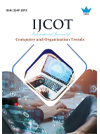A Survey on Software Requirement Models for Empirical Methods
 |
International Journal of Computer & Organization Trends (IJCOT) | 
|
| © 2017 by IJCOT Journal | ||
| Volume - 8 Issue - 1 |
||
| Year of Publication : 2018 | ||
| Authors : Zafar Ali |
Citation
Zafar Ali "A Survey on Software Requirement Models for Empirical Methods", International Journal of Computer & organization Trends (IJCOT), V8(1):8-14 January - February 2018, ISSN:2249-2593, www.ijcotjournal.org. Published by Seventh Sense Research Group.
AbstractAs technology advances existing theories are getting more and more complex to develop a model. Empirical methods are the only option in this situation. These methods are used for a variety of purposes. The software itself may need empirical methods. Empirical method might be needed for software engineering process analysis and improvement. In all cases, requirement models should be augmented to incorporate these empirical methods.
References
[1] D. Pandey, U. Suman, and A.K. Ramani, “A framework for modelling software requirements”, International Journal of Computer Science Issues, vol. 8, issue 3, no. 3, pp. 164 – 171, May, 2011.
[2] S. Moser, “Measurement and Estimation of Software Processes”, PhD Thesis, University of Berne, Switzerland, pp. 1 -31, November, 1996. Available: http://scg.unibe.ch/archive/phd/moser-phd.pdf viewed on 30th June, 2016. (references)
[3] R. Conradi and A. Fuggetta, “Improving software process improvement”, IEEE Software, pp. 2 – 9, July / August 2002.
[4] B.A. Kitchenham, S.L. Pfleeger, L.M. Pickard, P.W. Jones, D.C. Hoaglin, K. El-Emam, and J. Rosenberg, “Preliminary guidelines for empirical research in software engineering”, National Research Council, Canada, pp. 1 – 27, January, 2001.
[5] J. Lowgren, “Applying design methodology to software development”. in Proc. ACM Conference on Designing Interactive Processes, Practices, Methods and Techniques, DIS 1995, pp. 87 – 95.
[6] R.S.A. Van Domburg, “Empirical evaluation of change impact predictions using a requirements management tool with formal relation types”, M.S. Thesis, University of Twente, Enschede, pp. 1 – 48, November, 2009. Available: https://www.utwente.nl/ewi/trese/graduation_projects/2009/VanDomburg.pdf viewed on 15th July, 2016. (references)
[7] M. Batra and A. Bhatnagar, “Descriptive literature review of requirements engineering models”, International Journal of Advanced Research in Computer Science and Software Engineering, vol. 5, no. 2, pp. 289 – 293, February, 2015.
[8] X. Bai, H. Zhang, and L. Huang, “Empirical research in software process modeling: a systematic literature review”, inProc. IEEE International Symposium on Empirical Software Engineering and Measurement, September, 2011, Banff, A.B., pp. 339 – 342. (references)
[9] B.A. Kitchenham, T. Dyba, and M. Jorgensen, “Evidence based software engineering”, in Proc. 26th International Conference on Software Engineering, ICSE 2004, IEEE, pp. 1 – 9.
[10] B.A. Kitchenham, Guidelines for performing systematic literature reviews in software engineering”, EBSE Technical Report, EBSE-2007-01, pp. 1 – 57, Department of Computer Science and Mathematics, Keele University, and Department of Computer Science, University of Durham, UK, 2007.
[11] P. Zave and M. Jackson, “Four dark corners of requirement engineering”, ACM Software Engineering and Methodology, vol. 6, no. 1, pp. 1 – 30, January, 1997.
Keywords
software engineering; process layers; requirement model; empirical methods; evidence.

